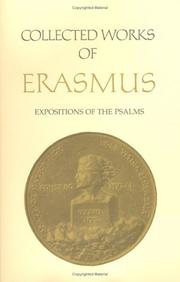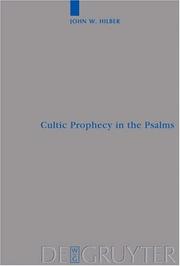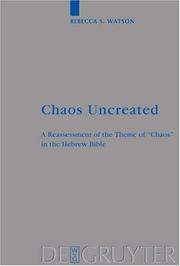| Listing 1 - 4 of 4 |
Sort by
|
Book
ISBN: 250352155X 9782503521558 2503521541 Year: 2005 Volume: 79 Publisher: Turnhout: Brepols,
Abstract | Keywords | Export | Availability | Bookmark
 Loading...
Loading...Choose an application
- Reference Manager
- EndNote
- RefWorks (Direct export to RefWorks)
223.3 --- Psalmen --- Jerome, --- Bible. --- Biblos Psalmon (Book of the Old Testament) --- Buch der Preisungen (Book of the Old Testament) --- Liber Psalmorum (Book of the Old Testament) --- Mazāmīr (Book of the Old Testament) --- Preisungen (Book of the Old Testament) --- Psalmen (Book of the Old Testament) --- Psalmoi (Book of the Old Testament) --- Psalms (Book of the Old Testament) --- Psalms of David (Book of the Old Testament) --- Psaumes (Book of the Old Testament) --- Pseaumes de Dauid (Book of the Old Testament) --- Salmenes bok (Book of the Old Testament) --- Salmos (Book of the Old Testament) --- Shihen (Book of the Old Testament) --- Sifr al-Mazāmīr (Book of the Old Testament) --- Soltar (Book of the Old Testament) --- Tehilim (Book of the Old Testament) --- Tehillim (Book of the Old Testament) --- תהלים (Book of the Old Testament) --- Zsoltárkönyv (Book of the Old Testament)

ISBN: 0802035841 0802044328 9786612003394 1282003399 144267475X 9781442674752 9780802035844 Year: 2005 Volume: 64 Publisher: Toronto ; London : University of Toronto Press,
Abstract | Keywords | Export | Availability | Bookmark
 Loading...
Loading...Choose an application
- Reference Manager
- EndNote
- RefWorks (Direct export to RefWorks)
Between 1515 and 1533 Erasmus wrote commentaries on eleven psalms, his only treatment of texts from the Old Testament. His principal aim was, as in his Paraphrases, to contribute, through the exposition of the Bible, to the renewal of preaching and devotional literature. This second of three volumes of the Expositions of the Psalms in the Collected Works of Erasmus, continues the chronological sequence of composition, containing commentaries on psalms 85, 22, 28 (the De bello Turcico), and 33.Erasmus wrote these expositions between August 1528 and February 1531, a time of growing anxiety for him as the bitterly contested issues of Reformation theology began to slip beyond hope for reconciliation. The expositions clarify his own fidelity to a moderate and conciliatory line of argument, and expose his constant preoccupation with the rediscovery of the spiritual dimension in Christian practice through ruminative meditation, which was the ultimate goal of these works. The expositions offer an absorbing range of nuances on the critical issues of the time, many of which have been neglected or obscured by partisan accounts of the Reformation crisis. Together, these three volumes open new sources for Erasmus scholars interested in humanist scriptural interpretation, the patristic heritage, and the religious and intellectual history of the Renaissance and Reformation.
223.3 --- Psalmen --- Theology. --- Christian theology --- Theology --- Theology, Christian --- Bible. --- Biblos Psalmon (Book of the Old Testament) --- Buch der Preisungen (Book of the Old Testament) --- Liber Psalmorum (Book of the Old Testament) --- Mazāmīr (Book of the Old Testament) --- Preisungen (Book of the Old Testament) --- Psalmen (Book of the Old Testament) --- Psalmoi (Book of the Old Testament) --- Psalms (Book of the Old Testament) --- Psalms of David (Book of the Old Testament) --- Psaumes (Book of the Old Testament) --- Pseaumes de Dauid (Book of the Old Testament) --- Salmenes bok (Book of the Old Testament) --- Salmos (Book of the Old Testament) --- Shihen (Book of the Old Testament) --- Sifr al-Mazāmīr (Book of the Old Testament) --- Soltar (Book of the Old Testament) --- Tehilim (Book of the Old Testament) --- Tehillim (Book of the Old Testament) --- תהלים (Book of the Old Testament) --- Zsoltárkönyv (Book of the Old Testament) --- Christianity --- Religion --- Christian literature, Latin (Medieval and modern) --- 873.4 ERASMUS ROTERODAMUS, DESIDERIUS --- 873.4 ERASMUS ROTERODAMUS, DESIDERIUS Humanistisch Latijnse literatuur--ERASMUS ROTERODAMUS, DESIDERIUS --- Humanistisch Latijnse literatuur--ERASMUS ROTERODAMUS, DESIDERIUS --- Érasme, --- Christian literature, Latin (Medieval and modern) - Translations into English.

ISBN: 3110184400 3110912732 9783110912739 9783110184402 9783110184402 Year: 2005 Volume: 352 Publisher: Berlin ; New York : De Gruyter,
Abstract | Keywords | Export | Availability | Bookmark
 Loading...
Loading...Choose an application
- Reference Manager
- EndNote
- RefWorks (Direct export to RefWorks)
Der Beitrag kultprophetischer Rede zur Entstehung der Psalmen wird stets diskutiert. Viele Erklärungsmodelle lassen außerbiblische Parallelen außer Acht. Dagegen zeigen assyrische Kultorakel Charakteristika prophetischer Rede, die auch in den Psalmen vorkommen, sowie Kompositions- und Aufführungsszenarien, die für eine Vereinbarkeit von Prophetie und Psalmgesang sprechen. Die beste Erklärung für die Entstehung von Psalmen, die eine Gottesrede enthalten, ist weiterhin ein kultprophetisches Modell. Doubts about the contribution of cult-prophetic speech to psalmody remain in debate. Psalms containing first-person divine speech exhibit numerous features and suggest life settings that conform to actual prophetic speech. Alternative explanations lack comparable examples external to psalms. On the other hand, Assyrian cultic prophecies parallel the characteristics of prophetic speech found in psalms. The Assyrian sources support possible composition and performance scenarios that overcome objections raised against the compatibility of genuine prophecy with psalmody. A model of cultic prophecy remains the best explanation for the origin of psalms containing first-person divine speech.
Prophecy --- 223.3 --- 221.08*4 --- Psalmen --- Theologie van het Oude Testament: cultus --- 221.08*4 Theologie van het Oude Testament: cultus --- Prophecy. --- Forecasting --- Bible. --- Bible --- Biblos Psalmon (Book of the Old Testament) --- Buch der Preisungen (Book of the Old Testament) --- Liber Psalmorum (Book of the Old Testament) --- Mazāmīr (Book of the Old Testament) --- Preisungen (Book of the Old Testament) --- Psalmen (Book of the Old Testament) --- Psalmoi (Book of the Old Testament) --- Psalms (Book of the Old Testament) --- Psalms of David (Book of the Old Testament) --- Psaumes (Book of the Old Testament) --- Pseaumes de Dauid (Book of the Old Testament) --- Salmenes bok (Book of the Old Testament) --- Salmos (Book of the Old Testament) --- Shihen (Book of the Old Testament) --- Sifr al-Mazāmīr (Book of the Old Testament) --- Soltar (Book of the Old Testament) --- Tehilim (Book of the Old Testament) --- Tehillim (Book of the Old Testament) --- תהלים (Book of the Old Testament) --- Zsoltárkönyv (Book of the Old Testament) --- Criticism, interpretation, etc. --- Prophecies.

ISBN: 3110179938 9783110179934 3110900866 9783110900866 Year: 2005 Volume: 341 Publisher: Berlin ; New York : Walter de Gruyter,
Abstract | Keywords | Export | Availability | Bookmark
 Loading...
Loading...Choose an application
- Reference Manager
- EndNote
- RefWorks (Direct export to RefWorks)
A re-assessment of the theory that the Hebrew Bible contains references to Yahweh's battle with a dragon or the sea, with special reference to the Psalter.
Bible -- Eau --- Bible -- Water --- Bijbel -- Water --- Dragons dans la bible --- Dragons in the bible --- Draken in de bijbel --- Eau dans la Bible --- Theomachie in de bijbel --- Theomachy in the Bible --- Théomachie dans la bible --- Water in de Bijbel --- Water in the Bible --- Dragons in the Bible --- 223.3 --- 221.08*3 --- Psalmen --- Theologie van het Oude Testament: themata --- 221.08*3 Theologie van het Oude Testament: themata --- Bible. --- Biblos Psalmon (Book of the Old Testament) --- Buch der Preisungen (Book of the Old Testament) --- Liber Psalmorum (Book of the Old Testament) --- Mazāmīr (Book of the Old Testament) --- Preisungen (Book of the Old Testament) --- Psalmen (Book of the Old Testament) --- Psalmoi (Book of the Old Testament) --- Psalms (Book of the Old Testament) --- Psalms of David (Book of the Old Testament) --- Psaumes (Book of the Old Testament) --- Pseaumes de Dauid (Book of the Old Testament) --- Salmenes bok (Book of the Old Testament) --- Salmos (Book of the Old Testament) --- Shihen (Book of the Old Testament) --- Sifr al-Mazāmīr (Book of the Old Testament) --- Soltar (Book of the Old Testament) --- Tehilim (Book of the Old Testament) --- Tehillim (Book of the Old Testament) --- תהלים (Book of the Old Testament) --- Zsoltárkönyv (Book of the Old Testament) --- Criticism, interpretation, etc. --- Bible. Psalms --- Criticism, interpretation, etc --- Theomachy in the Bible. --- Dragons in the Bible. --- Water in the Bible. --- Bible O.T. --- Dragons. --- Theomachy. --- Water.
| Listing 1 - 4 of 4 |
Sort by
|

 Search
Search Feedback
Feedback About UniCat
About UniCat  Help
Help News
News